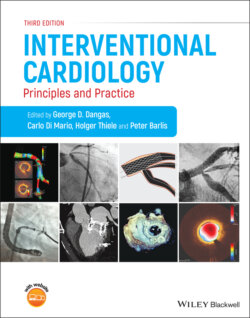Читать книгу Interventional Cardiology - Группа авторов - Страница 340
Impella
ОглавлениеCurrently, available evidence on the use of the Impella device in cardiogenic shock is limited to observational studies and one small randomized trial [22–24]. In the ISAR‐SHOCK (efficacy study of LV assist device to treat patients with cardiogenic shock) trials, 26 patients with advanced/established cardiogenic shock were randomized to IABP or Impella [22]. In this small study the cardiac index after 30 minutes of support was significantly higher in the Impella group compared with the IABP group (delta 0.49±0.46 l/min/m2 vs 0.11±0.31 l/min/m2, p = 0.02). Overall, 30‐day mortality was similar in both groups. Recent retrospective database studies using the American College of Cardiology’s National Cardiovascular Data Registry [25] and the Premier Healthcare Database [26] reported an association between higher mortality and use of Impella during PCI for CS as compared to either IABP or no Impella use. Given the retrospective nature of these data it is not possible to distinguish whether Impella is a marker for unknown confounders (sicker patients) or Impella leads to worse outcomes in CS. Randomized data is currently scarce, the 48‐patient IMPRESS‐in‐Severe‐SHOCK trial randomized intubated and ventilated patients with CS to Impella CP or IABP [27]. This underpowered study failed to show a benefit in terms of 30‐day mortality with Impella. The ongoing Danish‐German Cardiogenic Shock Trial (DanGer) is investigating whether mechanical support with Impella can improve survival in CS patients [28].
